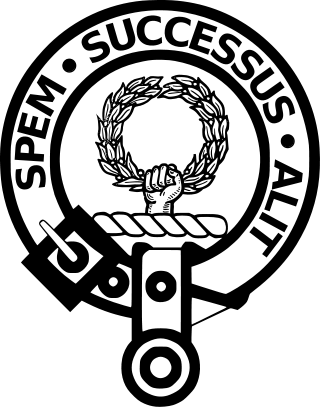
Clan Ross is a Highland Scottish clan. The original chiefs of the clan were the original Earls of Ross.

Earl of Glasgow is a title in the Peerage of Scotland. It was created in 1703 for David Boyle, Lord Boyle.

Earl of Kingston is a title in the Peerage of Ireland. It was created in 1768 for Edward King, 1st Viscount Kingston. The Earl holds the subsidiary titles Baron Kingston, of Rockingham in the County of Roscommon, Viscount Kingston, of Kingsborough in the County of Sligo, Baron Erris, of Boyle in the County of Roscommon, and Viscount Lorton, of Boyle in the County of Roscommon, also in the Peerage of Ireland. He is also a baronet in the Baronetage of Ireland. Between 1821 and 1869 the earls also held the title Baron Kingston, of Mitchelstown in the County of Cork, in the Peerage of the United Kingdom.

The office of Lord Clerk Register is the oldest surviving Great Officer of State in Scotland, with origins in the 13th century. It historically had important functions in relation to the maintenance and care of the public records of Scotland. Today these duties are administered by the Keeper of the National Records of Scotland and the Keeper of the Registers of Scotland.

Clan Douglas is an ancient clan or noble house from the Scottish Lowlands.

Balnagown Castle is beside the village of Kildary in Easter Ross, part of the Highland area of Scotland. There has been a castle on the site since the 14th century, although the present building was remodelled in the 18th and 19th centuries. It is the ancestral home of the Chiefs of Clan Ross, although since the 1970s it has been owned by Egyptian-born businessman Mohamed Al-Fayed. It is protected as a category B listed building, and the grounds are included on the Inventory of Gardens and Designed Landscapes in Scotland, the national listing of significant gardens.

David Boyle, 1st Earl of Glasgow was a Scottish politician and peer. He was the last Treasurer-depute before the Union with England.
Hawkhead is an area near Paisley in Renfrewshire, Scotland.

Clan Boyle is a Scottish clan of the Scottish Lowlands.

There have been seventeen baronetcies for persons with the surname Stewart, ten in the Baronetage of Nova Scotia, one in the Baronetage of Ireland and six in the Baronetage of the United Kingdom. See also Steuart baronets, Henderson-Stewart baronets, MacTaggart-Stewart baronets and Stewart-Clark baronets.
There have been seven baronetcies created for persons with the surname Sinclair, six in the Baronetage of Nova Scotia and one in the Baronetage of Great Britain. Four of the creations are extant as of 2008.
George Boyle, 4th Earl of Glasgow, GCH FRS, styled Lord Boyle until 1775, was a British peer.
John Ross, 1st Lord Ross of Halkhead was a Scottish nobleman.
James Ross, 4th Lord Ross of Halkhead was a Scottish nobleman and an adherent to the cause of Mary, Queen of Scots.
Robert Ross, 5th Lord Ross of Halkhead was a Scottish nobleman.
William Ross, 10th Lord Ross of Halkhead, was a Scottish nobleman.
George Ross, 11th Lord Ross of Halkhead, was a Scottish nobleman and soldier.
George Ross, 13th Lord Ross of Halkhead, was a Scottish nobleman.
William Ross, 14th Lord Ross of Halkhead, was a Scottish nobleman.

William Mure, known as others of his family as William Mure of Caldwell, was a Scottish lawyer and politician. He became a baron of the Scots exchequer, and was a friend of Prime Minister Lord Bute and David Hume.